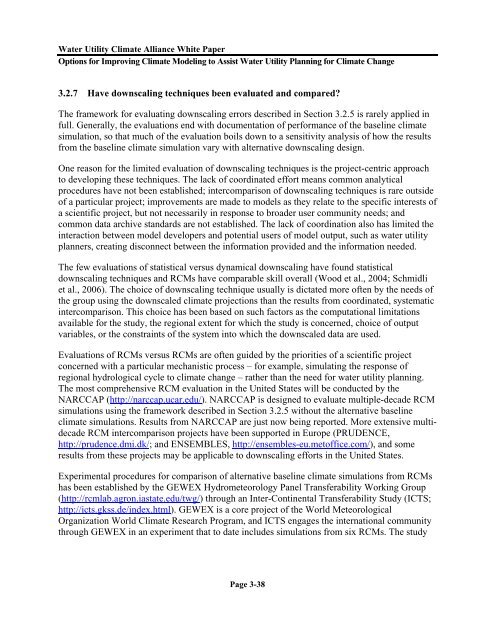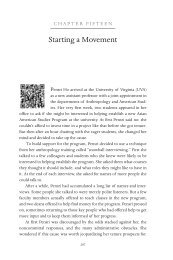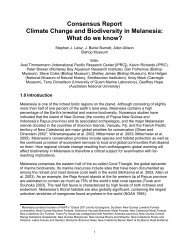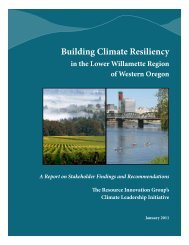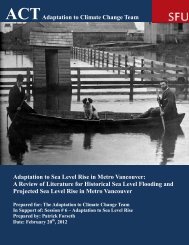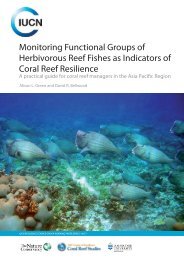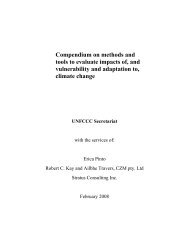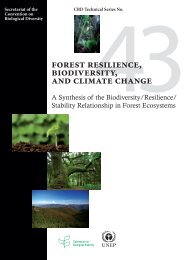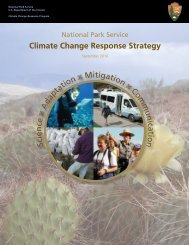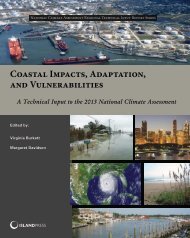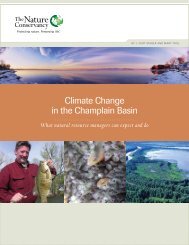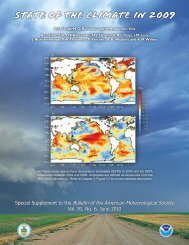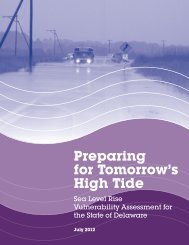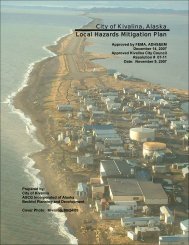Options for Improving Climate Modeling to Assist Water Utility ...
Options for Improving Climate Modeling to Assist Water Utility ...
Options for Improving Climate Modeling to Assist Water Utility ...
Create successful ePaper yourself
Turn your PDF publications into a flip-book with our unique Google optimized e-Paper software.
<strong>Water</strong> <strong>Utility</strong> <strong>Climate</strong> Alliance White Paper<br />
<strong>Options</strong> <strong>for</strong> <strong>Improving</strong> <strong>Climate</strong> <strong>Modeling</strong> <strong>to</strong> <strong>Assist</strong> <strong>Water</strong> <strong>Utility</strong> Planning <strong>for</strong> <strong>Climate</strong> Change<br />
3.2.7 Have downscaling techniques been evaluated and compared?<br />
The framework <strong>for</strong> evaluating downscaling errors described in Section 3.2.5 is rarely applied in<br />
full. Generally, the evaluations end with documentation of per<strong>for</strong>mance of the baseline climate<br />
simulation, so that much of the evaluation boils down <strong>to</strong> a sensitivity analysis of how the results<br />
from the baseline climate simulation vary with alternative downscaling design.<br />
One reason <strong>for</strong> the limited evaluation of downscaling techniques is the project-centric approach<br />
<strong>to</strong> developing these techniques. The lack of coordinated ef<strong>for</strong>t means common analytical<br />
procedures have not been established; intercomparison of downscaling techniques is rare outside<br />
of a particular project; improvements are made <strong>to</strong> models as they relate <strong>to</strong> the specific interests of<br />
a scientific project, but not necessarily in response <strong>to</strong> broader user community needs; and<br />
common data archive standards are not established. The lack of coordination also has limited the<br />
interaction between model developers and potential users of model output, such as water utility<br />
planners, creating disconnect between the in<strong>for</strong>mation provided and the in<strong>for</strong>mation needed.<br />
The few evaluations of statistical versus dynamical downscaling have found statistical<br />
downscaling techniques and RCMs have comparable skill overall (Wood et al., 2004; Schmidli<br />
et al., 2006). The choice of downscaling technique usually is dictated more often by the needs of<br />
the group using the downscaled climate projections than the results from coordinated, systematic<br />
intercomparison. This choice has been based on such fac<strong>to</strong>rs as the computational limitations<br />
available <strong>for</strong> the study, the regional extent <strong>for</strong> which the study is concerned, choice of output<br />
variables, or the constraints of the system in<strong>to</strong> which the downscaled data are used.<br />
Evaluations of RCMs versus RCMs are often guided by the priorities of a scientific project<br />
concerned with a particular mechanistic process – <strong>for</strong> example, simulating the response of<br />
regional hydrological cycle <strong>to</strong> climate change – rather than the need <strong>for</strong> water utility planning.<br />
The most comprehensive RCM evaluation in the United States will be conducted by the<br />
NARCCAP (http://narccap.ucar.edu/). NARCCAP is designed <strong>to</strong> evaluate multiple-decade RCM<br />
simulations using the framework described in Section 3.2.5 without the alternative baseline<br />
climate simulations. Results from NARCCAP are just now being reported. More extensive multidecade<br />
RCM intercomparison projects have been supported in Europe (PRUDENCE,<br />
http://prudence.dmi.dk/; and ENSEMBLES, http://ensembles-eu.me<strong>to</strong>ffice.com/), and some<br />
results from these projects may be applicable <strong>to</strong> downscaling ef<strong>for</strong>ts in the United States.<br />
Experimental procedures <strong>for</strong> comparison of alternative baseline climate simulations from RCMs<br />
has been established by the GEWEX Hydrometeorology Panel Transferability Working Group<br />
(http://rcmlab.agron.iastate.edu/twg/) through an Inter-Continental Transferability Study (ICTS;<br />
http://icts.gkss.de/index.html). GEWEX is a core project of the World Meteorological<br />
Organization World <strong>Climate</strong> Research Program, and ICTS engages the international community<br />
through GEWEX in an experiment that <strong>to</strong> date includes simulations from six RCMs. The study<br />
Page 3-38


